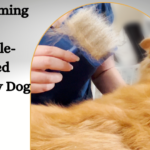
[ad_1]
“You know, saa-shaay! Her again finish sways aspect to aspect, and she or he will get down actual low within the rear. Sashay. Downtown dragging. You know, ‘Shawty received low, low, low.’ Not her regular Doxie dance.”
I used to be not being schooled on the most popular TikTook strikes, however on the sudden sauntering model of a 5-yearprevious Dachshund dubbed Dorothy. Apparently, I wasn’t getting it.
“She begins doing this for no purpose. She might be mendacity beside me, jumps down after which begins strolling hunched up and dragging her hind finish. If I contact her again she will get a little bit mouthy.”
To make her level, Dorothy’s mother pulled up a sleeve to disclose a nasty gash on her forearm slashed throughout an distinctive tattoo copy of Picasso’s “Lump” Dachshund.
Note to self: Avoid Dorothy’s pointy finish whereas inspecting the posterior elements. Also, ask her mother who did her ink.
Disc Diseases
I instantly noticed Dorothy was considerably weaker in her rear legs. I additionally famous a grimace as I approached her mid-back. My findings had been shortly starting to validate my preliminary concern: intervertebral disc illness.
Intervertebral disc illness (IVDD) is the commonest canine spinal situation recognized by veterinarians.
Typical scientific indicators are:
- Sudden weak spot (paresis) or paralysis in a single or each rear legs
- Intense localized ache alongside the spine
- Difficulty urinating or defecating
- Reluctance to face, stroll or climb stairs
If the damage is within the neck area, all 4 legs could also be concerned. There are many circumstances that may trigger related signs together with trauma, arthritis, immune-mediated or infectious diseases of the backbone, blood clots, neuromuscular ailments and tumors.
There are three varieties of IVDD veterinarians should distinguish between.
Hansen Type 1 IVDD happens when a part of the intervertebral disc, the protecting “shock absorber” positioned between the spinal vertebrae, ruptures or protrudes, compressing the spinal wire working down the middle. This causes extreme ache and interferes with nerve transmission, leading to weakness or paralysis. Type 1 is most frequently present in chondrodystrophoid (“short-legged” or “dwarf”) breeds comparable to Dachshunds, Corgis, Frenchies and Basset Hounds; canine with genetic mutations CDDY or CDPA; and canine with weight problems. These accidents normally happen within the mid-back generally known as the thoraco-lumbar junction or “TL.”
Type 2 is extra widespread in older, giant breeds and is a progressive, traditionally nonpainful, illness which will result in gradual hindlimb paralysis.
Type 3 are additionally referred to as “acute non-compressive” or “missile discs” and sometimes comply with trauma or damage.
Diagnosis is made on medical history and bodily examination, neurological assessments, X-rays, and MRI or CT scans. I’ll be the primary to confess that I think about any “sashaying sausage canine” to have IVDD till confirmed in any other case.
Testing and Monitoring
Dorothy’s mother had recognized the issue early, and my assessments revealed the presence of ache notion in each toes. I defined how the straightforward “pinch take a look at” is essential in determining how vital the spinal wire compression is in a canine. If a canine with suspected IVDD fails to withdraw his paw when the pores and skin between the toes is squeezed, that may be a signal surgical procedure is required urgently.
Another important take a look at is the “knuckle-over.” I gently bent the highest of Dorothy’s paw so she was “standing” on it. Healthy canine will instantly flip the paw again. Dogs with worrisome IVDD will both stay “knuckled-over” or very slowly return the paw to regular posture.
Finally, I emphasised the importance of monitoring for regular urine stream and pain-free bowel actions. Many canine with IVDD will develop weak bladder perform, placing them in danger for an infection and problems. Other canine will expertise painful defecations, resulting in constipation or worse. If Dorothy exhibited any changes in urine output or stream power, or cried or whimpered whereas going potty, she wanted to come back in directly.
Time for Treatment
Treating IVDD is dependent upon the sort, location, length, severity and professionalgression. Dogs who’ve change into paralyzed or misplaced feeling routinely want rapid surgical procedure to alleviate the stress on the spinal wire to eliminate ache and restore perform. The longer a canine suffers from extreme IVDD, the more serious the probabilities of full restoration change into. The majority of instances, especially when handled early, will enhance with a mix of anti-inflammatory medicine, rehab and relaxation.

Help your canine shed some kilos with weight loss program to assist ease stress on the backbone.
Dorothy handed all her neurological assessments, indicating doubtless delicate disc protrusion and spinal compression. X-rays didn’t present any apparent spinal abnormalities, so we elected to delay a neurologist referral and MRI except her situation worsened.
- I administered a potent anti-inflammatory injection and commenced class 4 laser remedy that day. We organized for considered one of our veterinary technicians to deal with her at residence two to a few instances every week for the subsequent 4 to 6 weeks.
- Strict relaxation and restricted transferment for the subsequent two weeks was additionally burdened. Short, intently monitored leash walks to make use of the toilet and sitting quietly in her mother’s lap or beside her had been going to be her solely actions till additional discover. Dorothy had a comfortable provider her mother would make extra-cozy throughout recuperation.
- In addition, we might later initiate oral anti-inflammatory medication mixed with an omega-3 fatty acid complement.
- I additionally prescribed a weight-loss plan to assist Dorothy shed just a few unhealthy kilos that had been including stress to her weakened backbone. Because protected weight reduction in canine is about 70% weight loss program and solely 30% train, she may safely start losing a few pounds earlier than growing exercise.
Immediate Treatment = Better Results
Within every week, Dorothy was pain-free. By one month, I okayed her to depart confinement, so long as she didn’t leap up (or down) or climb stairs. She had already misplaced a pound and was looking stronger every day. We continued laser remedy for an additional two months and maintained the Omega-3 DHA for all times. I’m blissful to report that Dorothy was again to regular inside six months, albeit a bit slimmer and smarter! Dorothy’s mother attributed the vigor and vitality to the DHA joint well being complement; I credited the load loss. We’re each most likely proper!
Prompt recognition and remedy allowed Dorothy to discontinue her “dragging” and resume her “Doxie dancing.” Back accidents must be evaluated promptly for greatest outcomes. If you suppose your canine is affected by weakness or ache within the again or legs, or is “getting too low” or “dragging round,” contact your veterinarian rapidly. And remember to inform them this isn’t about TikTook.
Dr. Ernie Ward is an internationally acknowledged veterinarian recognized for his improvements usually small animal apply, long-term remedy monitoring, particular wants of senior canine and cats, and pet weight problems. He is the creator of ‘The Clean Pet Food Revolution’ and has been a frequent visitor on quite a few TV packages.
Source www.dogster.com






